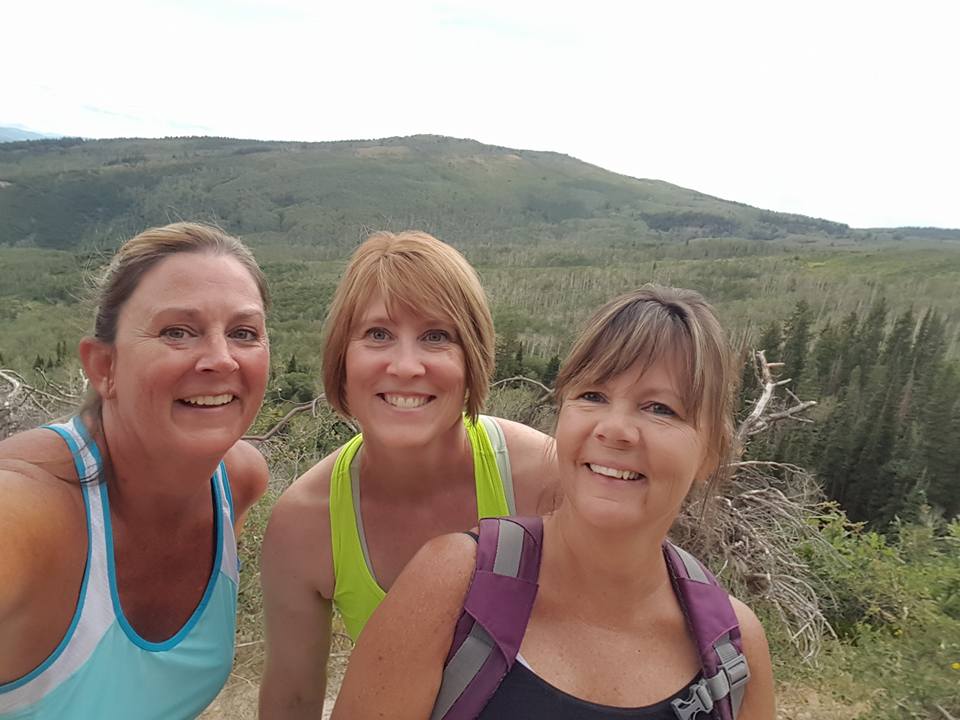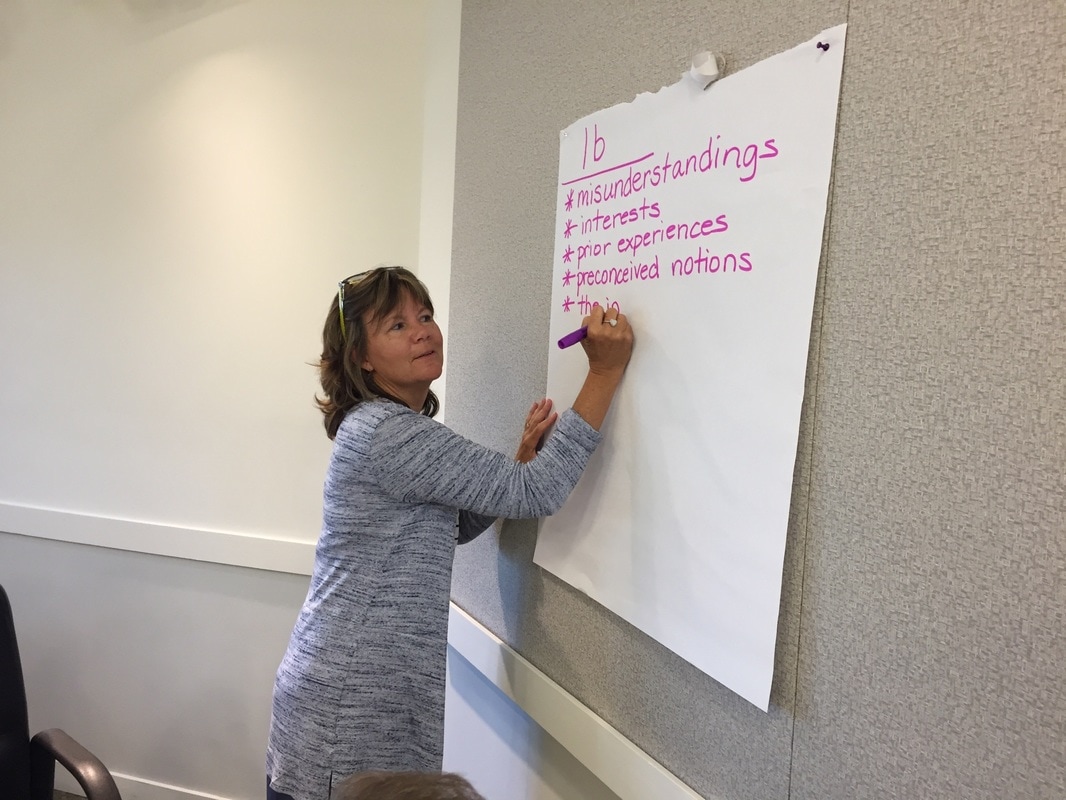|
This past week, I have been inundated with experiences, social media posts, notes, cartoons, quotes, and anecdotes from workshop participants that accentuate the importance of having people in our lives who make us happy even when the going gets tough.
It all started about a week ago, when my two very best friends (and their husbands) from college came up to stay with Dave and me in a house we had rented near Aspen, Colorado. First of all, what a brave act our husbands did by agreeing to spend a weekend with the three of us who giggle interminably about the silliest things (we are all educators and "get" the humor of little ones). Our stomachs ached and our eyes watered so many times over the three days we were together from laughing so hard---making fun when one of us said to our whitewater rafting guide, "How many oars do we each get?"; getting so tickled and laughing so loudly on a hike (on which I was fervently searching for bear or moose) that there was no way any wild animal would come near the three of us; sitting together on the deck, saying, "Okay, no talking. We are only going to read our books for a few minutes", when seconds later, a new conversation had begun. How incredibly blessed I am to have those friendships with people that are life-long and pick up right where they leave off---every time. But then I got on social media and saw a letter from one of the teachers with whom I used to work written to another teacher with whom I used to work, thanking her for being such an amazing influence on her son. Here is an excerpt from what she wrote: School wouldn't have been as wonderful as it was if it hadn't been for you. I have tried to figure out what makes you such a great teacher. Honestly, It's hard to describe you with words. It's a feeling. It's your demeanor. You're just the right amount of fun, but can easily be all business when needed. You are caring. Most teachers are (at least the ones I associate with), but there's something special about you. Maybe it's your tone? I've often heard the way you speak to your students. It's like you're carrying on a regular conversation when you're teaching, but you expect and receive respect from your students. The rest of what makes you so awesome hides inside you I guess Both of these teachers are amazing in their own right, by the way, and are frequently bragged about by me in my workshops (from the way they establish a culture of respect and rapport in their classrooms) to the way they demand a culture for learning. But what struck me the most is the unselfish way in which the writer of the email unabashedly praised the other teacher without ever worrying that doing so would diminish her own abilities. In some instances, I have seen teachers NOT compliment one another, for fear that, in doing so, they might be saying, "You are good so I must not be". On the contrary, I have come to believe that when we can see a strength in other people and acknowledge it, that single act can boost our own self and our own strength (after all, what could be stronger than being comfortable enough in your own skin to acknowledge the gifts of others?). In a recent workshop I taught, I heard one school leader say (and I'm paraphrasing), "I have learned so much from _______ , and I am so glad she is not afraid to share her great ideas with me." That, to me, is a win-win. A win on the part of the recipient of the help but a double win for the recipient of the compliment. I am hopeful this type of sharing of praise is self-perpetuating. The more we do it, the more we will do it. And, after all, why not? What makes you laugh? What makes you feel good? What fills your bucket? Just for today, perhaps you can do for someone else what you think might make their day. It probably can't hurt and it certainly could help---both of you!! Happy Communicating!! Shelly
0 Comments
 Sometimes, I wonder about the little things. Sometimes, I worry about the little things. Recently, I had a travel experience that encompassed both wonder and worry. Let's start with the worry. Does that sound familiar? Did you ever do the "I've got some good news for you and some bad news. Which do you want first?" When I was a principal in Florida, I read a book to the staff called "That's Good! That's Bad!" by Margery Cuyler and David Catrow. We talked about how almost every piece of news we get could have a first impression but if we consider it a bit longer, their might be other implications that are maybe not the same. Good lesson for our students, too. Check it out! So, back to my worry. I was on a flight that would be connecting in a large city. I didn't have much time for the connection so let's just say I was ready to take off. Unfortunately, the plane was not. Well, the plane was fine but the pilot announced that the runway we were going to be using had over 20 (yep! I didn't mistype that) aircraft lined up to take off on it, and it was going to be awhile. An audible frustrated sigh emitted from most every passenger in my neck of the woods. But sitting next to me were a dad and an eleven-year-old girl (we ended up talking quite a bit, so I'm not just making up her age). The girl had never flown before. First flight. Do you remember yours? I do mine. It was on Southwest Airlines from Houston to San Antonio (to call that a short flight would be a massive understatement) and I was so excited about taking off, I could hardly stand it. So there we were, waiting for the rush hour of aircraft to dissipate, while all this time the sweet girl is sitting wide-eyed, staring out the window in awe. She kept asking her dad questions. We had some time, so the three of us began talking as well. She was fascinated by the idea of flying as often as I do (that's good), and I didn't want to burst her bubble by telling her the dew comes off the flying rose fairly quickly (that's bad). See how the book works? So, while everyone else is frustrated with the late take-off (one gentleman even said aloud, "F*** this; why can't we just go??") That's bad, in case you are wondering, particularly since he did not say "Fancy this" and remember, we are all sitting near this sweet girl who has never flown before. Furthermore, what is Fancy Guy thinking we should do---cut in line?? The pilot finally comes back on and says, "The bad news is we are still 20 deep to get to this runway. The good news is they are allowing our plane to head to another runway to take off in a different direction. We are taking it!" (I assume he must have read the children's book, as well!) ;) We were all thrilled to hear this, but all I could think was: While everyone else is so frustrated with the late take-off, this 11-year old "newbie" is wide-eyed and smiling from ear to ear. Once we started taxiing the other way, she asked, "How long will we taxi?" "Does it feel funny when you first go up in the air?" "Will it start going faster and faster when we taxi?" She'd ask her dad then she'd ask me. I loved it!! I told her it was the sort of experience you can't explain but she would talk about it for days and weeks to come. The look on her face when we took off was priceless! Other people breathed a sigh of relief (we were finally on our way, after all), but that sweet 11-year old was breathless and still grinning and giggling. Once we were in the air, she asked her dad if she could take pictures of the clouds. All this reminded me of one of the stories from Randy Pausch's book "The Last Lecture". He used to work at Disney before he became a professor at Carnegie-Melon University and later passed away from cancer. He said the Disney workers would always get asked, "What time does the park close?" The employees were taught to NOT say, "The park closes at 10 p.m." but instead say "The park will remain open all day until 10 p.m. tonight!" I love that! Same premise, different words. One is "That's bad" and one is "That's good". And between a first time flight and a trip to Disney, it's about the wonder of it all, right? Just for today, perhaps we can find the wonder in all we do! Happy Communicating! Shelly Danger, danger, Will Robinson! Fair warning that this post may sound a bit like a soapbox address, as it addresses an issue I am currently seeing on social media: focusing on the negative.
It all started, once upon a time, when a friend posted about a certain airline ("I'll never fly that airline again. They delayed and made me miss my connecting flight"). One of her friends backed her up, "I know. That happened to me on the same airline. I won't fly them either." Oh, how I didn't want to jump in the controversy, but, having a bit of experience with air travel the past four years, I know one thing for certain: all airlines get delayed; all airlines have maintenance issues; and all airlines have on-time departures and early arrivals at times. That post got me thinking about how some of these same people give a restaurant one chance. If things are not 98% up to their standards, not only do they refuse to return to the establishment but they often talk poorly about the food, the people, the...everything....based on one single visit. How am I about to relate this to education? I recently read a colleague's post on social media---an article that totally trashed a leading educator's book on classroom management techniques, questioning skills and strategies to encourage participation in classrooms. My first response? Instead of relegating a book to the rubbish bin, how about instead looking for any pearls of wisdom we might glean from it? For instance, what about the teacher who is struggling with a particular sort of teaching behavior? For example, in my work in all types of schools (from Bogota, Colombia to NYC to rural Washington State to schools on Native American reservations, teachers often struggle with "How do I start my class so that students know I have high expectations of them from the get-go?" I work with several superintendents who say, "We can tell them generally to get better at their routines and procedures" (we, as Danielson consultants call that 2c "managing routines and procedures), "but what we really appreciate is when a consultant/facilitator can actually model those explicit teacher moves that help the teacher learn some new strategies to add to their toolkit". I think the previously trashed author offers some of these---is it the end-all, be-all? Of course not, but neither (In my humble opinion) is poo-poo'ing some strategies some really great strategies that might add to a new or seasoned teacher's repertoire. I feel that this "throwing out the baby with the bathwather" has become a rather popular tact, in social media, in conferences, at faculty meetings, and I'm not sure of the logic. In a recent keynote and subsequent workshop I taught in the Upper Peninsula, one participant said, "It is so refreshing to have someone not just tell us what to do or what not to do; what's bad to do or what's good to do. Instead you are modeling effective strategies for us. I'm picking up all of them, but some others may just take one or two." Now, how is that for solution-oriented?? I often share with participants in my workshop that it would be so easy for every single one of us to consider our teaching situations terminally unique---so very different than anyone else's. Instead, I suggest that they look for each piece of learning as an opportunity to adapt for one's own teaching situation. Obviously, it's easier to say, "Well, that would never work in my building..." or "You don't know the kids I have in my class". But, I wonder if we do that, are we simply setting our profession up for poo-pooing every idea we come across---making us even more vulnerable to going back to operating in our own little silos? Just for today, perhaps we could take a look at a publication, resource, airline, restaurant, conference, or even professional learning opportunity and search for one strategy we can either use or adapt for our own needs? A special thanks goes out to my dear new colleague, who is a band director, and said to me, "So many workshops I go to focus on the general classroom educator. I always look for ways to adapt those strategies to meet the needs in my bandroom or on the marching field." Happy Communicating! Shelly In so many districts, I see professional development still being done as a "one size fits all". One of the things we are trying to do more and more is differentiate the learning for particular needs. For example, even in one 75-person faculty, we might ask participants to line up in order of self-chosen level of proficiency on "questioning and discussion skills". Then, it is quite easy to number off and have people seated at "like-minded" tables. The discussions around certain new learnings might then be a bit more tailored to the group. Is there also merit in mixing things up? For sure! I just did a keynote presentation in one district for three hours on the first day of a district-wide "summit", then participants got to choose their own day and a half professional learning on topics such as new technology, engagement strategies (that was me!), and several more. In this manner, teachers are advocates for their own learning.
I could continue with my own experiences, but in the interest of expanding the expertise, I want to share a blog I read on Humanizing Teacher Professional Learning. Check it out and let me know what you think!! Happy Communicating, Shelly |
Shelly ArnesonCategories |





 RSS Feed
RSS Feed